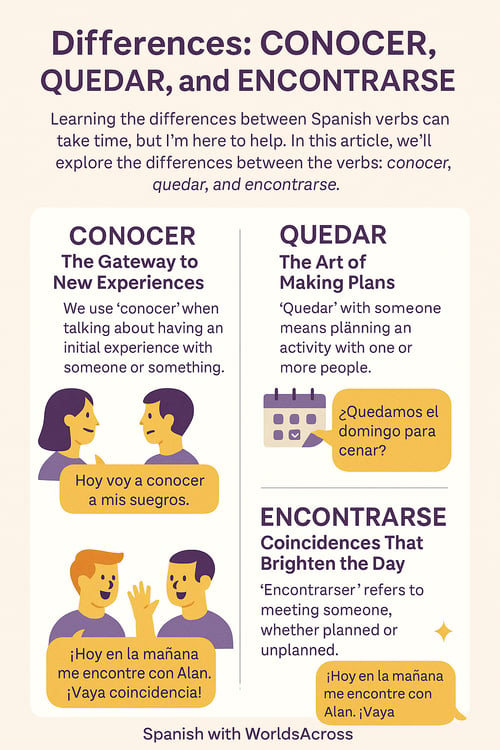Differences: CONOCER, QUEDAR, and ENCONTRARSE in Spanish
Some time ago, Paul, an old friend and Spanish student, arrived in Bogotá. Excited about his new life in the city, he decided to invite a coworker to dinner. With enthusiasm, he asked her, “¿Quieres saber mañana para la cena?” She, smiling, explained, “Paul, in Spanish, we don’t use conocer to make plans; we say quedar.” At that moment, Paul realized that although he knew many words, some have their own nuances.
If something similar has ever happened to you, don’t worry! Learning the differences between Spanish verbs can take time, but I'm here to help. In this article, we'll explore the differences between the Spanish verbs: conocer, quedar, and encontrarse.
So, let’s get started!
Conocer: The Gateway to New Experiences
Learning to use "conocer" is quite simple. We use it when talking about having an initial experience with something or someone. For example, imagine you’re visiting a new place or meeting someone for the first time. In these cases, "conocer" is the perfect word.
Examples:
- “Hoy voy a conocer a mis suegros” (Today I am going to meet my in-laws) means it’s the first time you’ll see your partner’s parents.
- “Mi sueño es conocer Finlandia” (My dream is to visit Finland) indicates that you’ve never been to Finland, but it’s one of your greatest wishes.
Remember, "conocer" is ideal for those “first encounters.” Don’t forget to use it when talking about people or places you haven’t experienced yet!
Quedar: The Art of Making Plans
The word "quedar" may seem a bit confusing at first, but don’t worry—it’s easy! To fully understand the meaning of "quedar," think of it as making plans. Essentially, quedar with someone means planning an activity with one or more friends. This is key to good communication.
Examples:
- “Hoy he quedado con mi familia para ir al parque” (Today I’ve made plans with my family to go to the park) means you arranged a family meeting, and everyone coordinated to attend.
- “¿Quedamos el domingo para cenar?” (Shall we meet on Sunday for dinner?) indicates that you and someone else are making dinner plans for that day.
Now you know! If you want to talk about plans or organizing an event, use quedar! Just remember not to confuse it with quedarse, which means to stay in one place.
For example: “Hoy voy a quedarme en casa” (Today I’m staying home).
Encontrarse: Coincidences That Brighten the Day
Have you ever run into a friend without planning it? That’s exactly what encontrarse means! This verb refers to meeting someone, whether planned or unplanned. You can also use encontrarse to describe how you’re feeling, both physically and emotionally. It’s a very versatile verb that can enrich your conversations.
Examples:
- “Hoy en la mañana me encontré con Alan. ¡Vaya coincidencia!” (This morning, I ran into Alan. What a coincidence!) means the meeting was unplanned.
- “Mañana mis amigos y yo vamos a encontrarnos en el cine a las 8:00 p.m.” (Tomorrow my friends and I will meet at the cinema at 8:00 p.m.) indicates that the meeting was planned, so don’t forget your tickets!
- “¡Hoy me encuentro estupendo!” (Today I feel great!) expresses that the person feels very good and is a great way to share your mood.
Remember: if you want to say you ran into someone, use encontrarse. Talking about an upcoming meeting? Use encontrarse. Want to describe how you feel?
You can use it for that too!

Exercises: Test Your Knowledge
Great job! Now you know the differences between the Spanish verbs conocer, quedar, and encontrarse. To help you master them, here are some exercises. Give them a try! You’ll do great!
- Algún día voy a (quedar/ conocer/ encontrarme) Madrid.
- Ayer fui al cine y (conocí / quedé / me encontré) con mi profesora de español.
- Hoy he (quedado / conocido / encontrado) con mi novia para ir a pasear.
- ¿Quieres (encontrar/ quedar / conocer) para tomar algo después de clases?
- Ayer (conocí / me encontré / quedé) a tu padre; es muy gentil.
- Hace poco, mi madre (se encontró / conoció / quedó) con Julie, una amiga de su infancia.
Master Spanish Without Complications
And that’s it! Now that you know the differences between Spanish verbs like conocer, quedar, and encontrarse, you can feel more confident using them! It may seem complicated at first, but with practice, it becomes easier.
Remember, understanding the nuances of Spanish verbs will help you communicate more clearly and naturally. If you want to continue improving your Spanish, at WorldsAcross, we’re here to help. Don’t hesitate to contact us! Together, we can make your learning journey more fun and effective.



